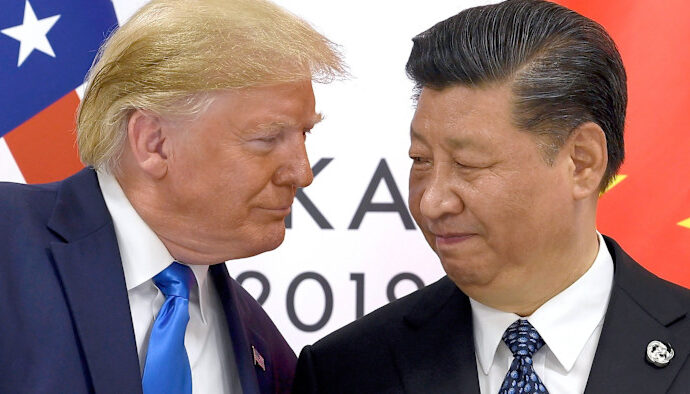Japanese government officials are telling companies they would be “on their own” if they needed to evacuate staff from Taiwan in case of a Chinese attack, according to people familiar with the matter, a message that has hit one of Taiwan’s largest sources of foreign direct investment.
Tokyo’s warning highlights the practical and political difficulties for governments and companies in the region of preparing for a potential cross-Strait war. Beijing claims Taiwan as part of its territory, and has threatened to take it by force if Taipei refuses indefinitely to submit to its control.
The US military has been discussing operational plans for such a scenario with its allies, but obtaining political commitments has proven more challenging. The Financial Times reported last week that the Pentagon had pressed Japan and Australia to clarify what role they would play in a US-China war over Taiwan, frustrating Tokyo and Canberra.
Two Japanese officials told the FT that, under the country’s pacifist constitution, its military could only be deployed abroad with approval from a host government.
Given that Japan does not recognise Taiwan diplomatically — as with all but 12 countries in the world — there “is no government in Taiwan from our viewpoint”, one of the officials said. They added that China was unlikely to grant the Japanese military approval to conduct evacuations.
Although the Japanese government has never confirmed this line as its official position, companies have been receiving the warnings for about three years, diplomats and corporate executives said.
Japanese diplomats told company risk officers that “you are on your own if you put significant assets in Taiwan”, said one person present at one of the conversations.
The warnings have had a chilling effect on Japanese business in the country.
“It has discouraged investment. There is lots of new US investment in Taiwan, but barely any Japanese,” said a US official familiar with the issue.
Foreign direct investment by Japanese companies — traditionally Taiwan’s third-largest source of FDI, after the EU and US — slumped 27 per cent last year to $452mn, and is down from a peak of $1.7bn in 2022.
Almost 3,000 Japanese companies have operations in Taiwan, according to Teikoku Databank, a research group, of which one-third is involved in manufacturing, especially semiconductor materials and equipment. Retailers, wholesalers and restaurant groups are also big investors.
Many multinationals reassessed the risks to their assets in both Taiwan and China after then-US House Speaker Nancy Pelosi’s visit to Taipei in 2022 prompted Beijing to launch large-scale military exercises around Taiwan. But acute concerns over the risk of war had mostly died down since then, executives and consultants said.
In contrast to the drop in Japanese investment, FDI from several other countries hit record levels in 2024, driven by funding for data centres and offshore wind farms. Investment from US companies reached $938mn in 2024, almost double the 2022 amount, while that from the UK almost tripled over the same period to $1.54bn.
People familiar with the US-Japan military alliance called Tokyo’s messaging to companies unhelpful, with one person saying that in a crisis, operational needs were likely to outpace “Japanese bureaucrats tying themselves in pretzels”.
In 2021, Japan’s military participated in evacuations from Afghanistan without local government approval after the Taliban toppled the Nato-backed administration in Kabul. Some military experts cited that operation as a potential precedent for Taiwan.
But a Japanese executive said that, in the absence of security guarantees from either Tokyo or Washington, the “risk assessment pretty much leads us to little interest in Taiwan” as an investment destination.
Since 2022, several big Japanese companies have conducted annual simulations of evacuating employees in Taiwan in the event of a Chinese invasion, according to two people familiar with the matter.
Japanese government officials have attended these exercises, but not in an official capacity, the people said. The implicit understanding was that such efforts would be a private sector operation, according to one of the people.
One of the people involved in the private sector plans said any evacuations were envisioned as occurring before a Chinese invasion, but such operations would need handling carefully to avoid attracting Beijing’s attention and jeopardising mainland China staff.
“The key issue is timing and who can be supported,” the person said. “We need to take pre-emptive and proactive actions to bring back our people . . . This scenario doesn’t have any Self-Defence Forces or military support.”
Japan’s defence ministry said it was difficult to answer a hypothetical question regarding a Taiwan emergency. The country’s response would be “implemented on an individual and specific basis in accordance with the constitution, international law, and domestic laws and regulations, including the legislation for peace and security”.
Japan’s foreign ministry said protecting citizens overseas was one of the government’s most important responsibilities.
“In the event of a situation where the evacuation of Japanese nationals is necessary anywhere in the world, including Taiwan, we will make every effort to support the evacuation . . . by utilising the fastest and safest means while exploring all possibilities,” it said.


